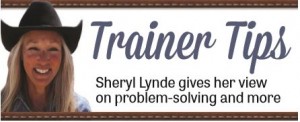 When looking to purchase a horse, an important point to remember is that someone in the relationship needs to have more experience than the other.
When looking to purchase a horse, an important point to remember is that someone in the relationship needs to have more experience than the other.
If the rider is green, or a beginner, the horse selected needs to have more experience than the rider. If the horse is green, or young, the rider needs to have more experience than the horse. There is an old equation that has proven itself timeless and is spot-on: Green + Green = Black and Blue.
In addition to taking an accurate inventory of the rider’s skills and ability, another essential component to a successful pairing is to establish the desired use of the horse. Whatever discipline the rider will be pursuing, whether it be a specific competitive sport or trail riding, the chosen horse needs to have had that experience in his riding career.
There are always exceptions to these rules for the gifted equestrian or the extraordinary horse. However, are you willing to risk your safety and the well-being of the horse on the outside chance that you are the exception?
At a recent clinic I was giving, I had a novice participant. She had the dedication that is vital to learn and develop her skills. However, the horse she was paired with was undermining her efforts. This mare came from a show background and was retired because of an injury. I knew this horse and had seen her compete in her not-to-distant past. She was athletic, intelligent and a beautiful mover, but the mare I was watching this particular day was not the same horse. Her injury had healed properly, and she was ready for work. Yet, she was pinning her ears, refusing to move forward, trying to bite the legs of the rider — just generally annoyed. I could see there was a buck developing, maybe not this day, but it was coming.
Both rider and horse were frustrated. The rider was making all the common mistakes that a beginner rider should be allowed to make. After all, making mistakes is an essential step in the progression of developing a new skill set. This is the process that everyone goes through in their journey of discovery, and there is no skipping this stage. Put another way, the rider was effectively learning basic math, but trying to learn while riding this mare was equivalent to skipping math and going straight to geometry. Both rider and horse were very frustrated, and the rider’s confidence was slowly evaporating.
Also, the mare’s reputation for being difficult was emerging. But the mare wasn’t difficult. I hopped on and rode her, and she slowly let go of her surly behavior and moved out willingly. I found her skills again which she gladly exhibited. Let me give you another adage that rings true every time: Different rider, different horse. Luckily, this was a horse the rider was leasing. She was paired with a more appropriate horse and she found her smile again. The mare the rider brought to the clinic is being ridden by a more experienced rider who can appreciate and complement the horse’s abilities. Did the rider fail the horse? Absolutely not. She did what was best for the horse and let her go. In this case the mare had more experience than the rider, but it wasn’t the type of experience that was suitable for a novice level rider.
This mare was headed for the futurity when she was derailed by an injury. It takes time and years of training to successfully compete at this level. There was much expected of this mare in her previous training regime. When she gave the response asked of her, she was rewarded with a timely release that she could depend on. A novice rider just doesn’t have the feel and timing necessary to recognize when their horse has appropriately responded and has given to the cue requested of them. If the release isn’t given in a timely manner on a horse that has had this level of training, the horse becomes very irritated and unforgiving. No one failed the other; it just wasn’t a good match for either the horse or rider. You can’t rush through the levels of horsemanship. The rider needs a horse that will allow her to make the mistakes that a novice rider makes. This is how we learn.
When looking for a horse to purchase, it’s always a great idea to leave room in your budget for a trained professional to help guide you through the process. It’s an excellent opportunity to sharpen your skills and develop a clear understanding of your horse’s needs.
Just remember, there are plenty of excellent horses out there. By keeping these tips in mind along with careful and thorough research, you will be rewarded with an incredible relationship.
* Sheryl
Leave a Comment
All fields must be filled in to leave a message.